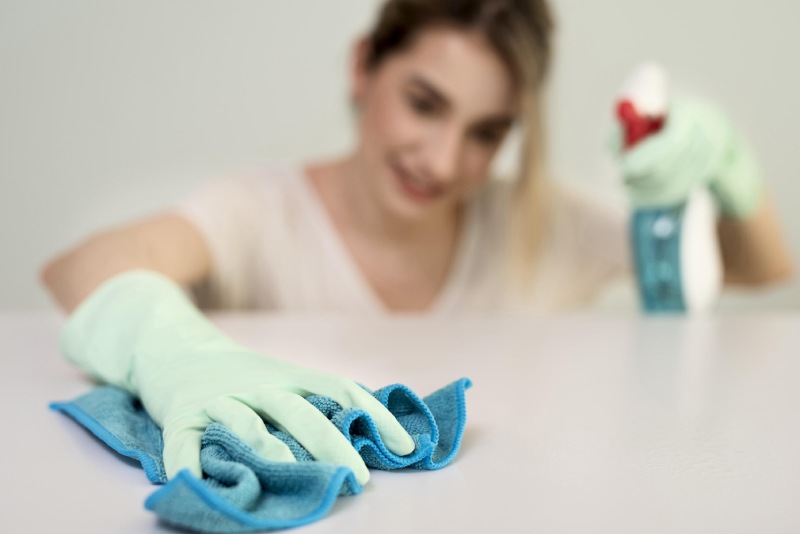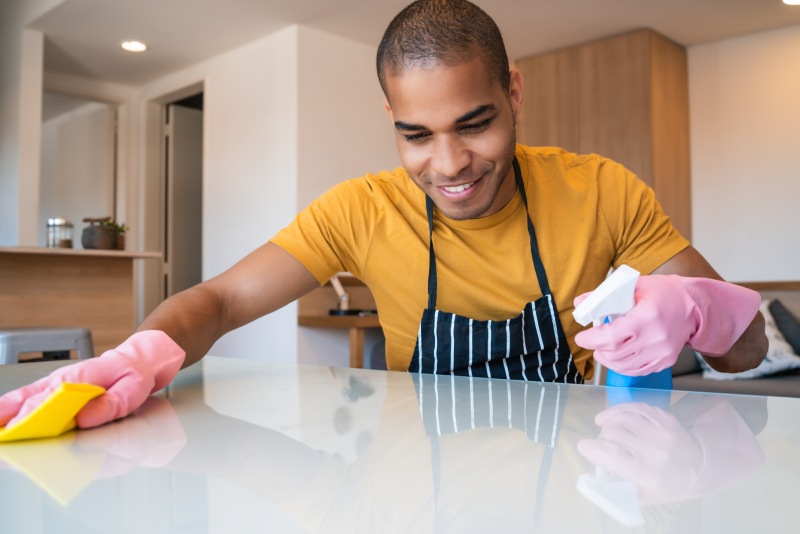Ever wondered how to clean stains on granite countertops in your beautiful new kitchen? Even though these stone countertops may seem indestructible, if granite is not properly maintained, it can be exposed to stains coming from the most simple elements like water, rust, or oil.
Granite is one of the most beautiful and unique, but also one of the most durable natural materials that just fit perfectly on kitchen countertops. It gives every kitchen its distinctive style while serving the purpose of a work surface that can resist daily use that includes moisture, heat, various food stains, and other kinds of wear and tear.
However, with all its strengths and benefits, if not cleaned and maintained properly, granite countertops can be susceptible to stains coming from very simple daily use.

What Can Create Stains on Granite Countertops?
Granite doesn’t stain instantly, but rather over time, especially if not properly sealed and maintained. Being a natural stone, granite can be affected by substances you use every day in your kitchen, and soak up liquids. Therefore, be careful with water stains, alcohol, dark hot drinks like coffee or tea, fruit, oils, etc.
How to Clean Hard Water Stains?
Even though granite countertops are regularly cleaned, a filmy buildup from hard water stains may appear around the sinks, faucets, and kettles after a while. Hard water often contains minerals like calcium, magnesium, or artificially added chemicals like chlorine or fluoride which can react with soap and leave a filmy scum that accumulates over time. Deposits of hard water can also turn into a scaly buildup on the surfaces of your countertops, and damage their appearance.
One of the most important things to know when understanding how to clean hard water stains off granite countertops is that you must never use acidic substances, i.e. vinegar, to remove the stains as they can damage the sealant that is protecting the stone. However, there are still effective and simple alternative ways to eliminate these ugly stains without risking destroying your countertops:
Keep the countertops clean
Regular cleaning is the best formula for any maintenance, however, when wiping your granite countertops daily with a soapy sponge, make sure to rinse them thoroughly afterward. Lingering soap can leave residues, especially in reaction with hard water, and leave ugly stains.
After wiping and rinsing the countertops, the surface should stay completely dry. Standing water can leave mineral deposits that are hard to remove and harmful to the sealant. To avoid this, wipe properly any spills, and always have a microfiber cloth at hand.
Stone cleaner
Even though mild dish soaps in combination with water do well for cleaning natural countertop surfaces, they may react differently when in touch with hard water. Choosing a specialized natural stone cleaner is a better choice, as it will let you avoid the issues with hard water stains and help you preserve your granite countertops’ beauty.
Treat the stains as soon as possible
As soon as you notice any stains on the granite countertops, try to treat and remove them. A good tip for removing water stains early is to simply apply a gentle cleanser and scrub them with a soft sponge after which you will rinse and dry the surface thoroughly.
Cleaning paste
Instead of using aggressive cleaners, a stronger substance for cleaning scaly buildup on kitchen countertops can be a simple paste made of baking soda and water. Add it to the affected area and scrub the stain with a soft sponge to safely remove it. Rinse and dry the spot after that.
Make a poultice
When talking about cleaning countertops, a poultice refers to any pasty, moist substance made to treat stains. You can buy a granite poultice in a store, or simply make one yourself with baking soda and water.
Apply the poultice to the stain and cover it with plastic wrap. Let it sit for at least 24 hours, and then wipe or scrub it off the surface, and hard water stains should be gone. If they are not, repeat this process a few more times.
Try a razor blade
Using a razor blade to remove hard water stains should be your last option. If you can’t remove them otherwise but to scrub them off, use a single-edged razor blade and be extra careful not to cut into the sealant. If you manage that, your countertops will be as good as new.
Make sure to seal countertops regularly
Maintaining a sealant on your kitchen countertops will protect the granite from stains the mineral deposits from water can cause. Even though the sealant can’t prevent all dark water stains on granite countertops, it will preserve the material itself and prolong its shiny life.
How to Remove Oil Stains?
When granite is exposed to oil and grease, it will stain as well. Properly sealed countertops and regular cleaning can prevent the stains, however, if the greasy or oily substance is left on a granite surface for a while, stains are very likely to appear.
Still, there are a few effective tricks on how to remove oil stains from granite countertops and restore them to their original beauty:
Remove the oil as soon as possible
To prevent the oily stains from appearing on your granite, remove them as soon as you can so they don’t penetrate the surface. As long as the oil stays on the granite, the stains will get worse.
Use a paper towel or a sponge to soak up the oil and not spread it even further. If the oil didn’t sit on the granite for too long, this action will remove the stain completely. However, for older stains and more stubborn ones, you may need to use a bit more effort to remove them and restore your granite’s shine.
Make a cleaning paste
If regular cleaning methods fail when you try to remove the oil stain from granite, try the trick we suggested for the hard water stains too. Make a paste using baking powder and water and apply it to a completely dry surface. After covering the stain with the paste without rubbing it, let it sit there for 24 hours. After that, remove the dried paste and clean the area only with water. If needed, repeat the process until the stain is gone.
Reseal the surface and prevent new stains
Be sure that preventing oil stains on granite surfaces is much easier than removing them later, so pay attention to that, and remove the spills immediately after they occur. The granite sealant is there to protect the surface from stains, so make sure you reseal it regularly, especially after removing some difficult stains.
How to Remove Rust Stains?
Rust stains can appear on granite countertops from particles that contain iron and come in contact with the stone surface. Granite itself won’t rust but if traces of iron minerals mix with it, rusty stains could appear. Metal objects standing on the granite surface for a long time, like cans, screws, or different utensils could oxidize and cause difficult rust stains.
Untreated rust stains can seriously damage a granite surface. If not properly sealed, a buildup of rust can appear even periodically, depending on the type of surface and the conditions around it.
However, the good news is that there are several effective options on how to remove rust stains from granite countertops:
Commercial granite cleaners
Consider using the granite cleaners that are available on the market and give them a try. Many of them will work very well and absorb the rust leaving your countertops clean and shiny again.
Homemade cleaners
The best alternative way how to clean rust stains from granite countertops is the already mentioned poultice made of baking soda and water. This trick does wonders on granite surfaces, but when it comes to rust, its efficiency will depend on the intensity of the stain.
If the stain is fresh, the baking soda paste should definitely work. Apply it onto the stain and leave it there for 24 hours. After it’s dry, brush it off with a soft sponge to clean the surface.
Hydrogen peroxide
If the stains are harder to remove, try spraying the area with hydrogen peroxide and let it again sit for a day. Scrub the surface only after 24 hours, and the rust should be removed. If that still isn’t enough, you should look for professional cleaning assistance from cleaning services in Dallas.
Prevent the rust buildup and seal the surface
After removing a difficult stain, the granite surface needs to be resealed and protected by a good quality sealant. The sealant will preserve the beauty of the material and help you avoid new stains on granite countertops.
To assure you maintain your granite surfaces properly, you should apply new sealant even a few times per year. Another idea on how to get stains out of granite is prevention. Keep the surfaces dry, regularly check that the faucets don’t leak, and pay attention not to leave metal or iron things directly on the granite surface for too long. If you have a metal drying rack for dishes, keep a cloth under it, or consider getting a wooden, or a plastic rack.
How to Remove Stains From Granite Kitchen Countertops?
Natural granite countertops, especially those that are exposed to frequent use in the kitchens can suffer from all sorts of stains. Wiping the surfaces immediately after the spill happens is surely the best way to prevent stains on granite countertops, but is that always possible?
Sometimes the stains remain and get very difficult to clean which then may require assistance from services that manage commercial cleaning in Dallas TX. Professional cleaning services can provide some more advanced solutions and cleaning on another level.
They would assess the stain to understand its type and intensity and decide on the proper cleaning method. Depending on the stain, a pre-treatment might be required before the actual cleaning starts. Professional cleaners would apply only specialized cleaning substances made for granite surfaces, and take time to apply the poultice.
When removing the stains from granite countertops, professionals may practice steam cleaning, polishing and finally sealing the surface to completely protect it from new stains and restore its shine.
How to Disinfect Granite Countertops?
Disinfecting the granite countertops properly is important for keeping your kitchen environment clean and healthy. A simple cleaning with mild dish soap and warm water is perfectly enough for regular daily cleaning, however, if you need a stronger disinfectant, try using 70% isopropyl alcohol, let it sit for a bit, and then rinse the surface with water.
Make sure you always use a soft microfiber cloth that won’t damage the granite sealant, and avoid any acidic, ammonia-based cleaners, or bleach. After each cleaning of the countertops, the last step is to make sure you leave them completely dry and avoid the risk of stains coming back.

How to Protect Granite Countertops From Stains?
To maintain the beauty of your granite kitchen countertops, you must protect them from stains. Ensure they are sealed with a high-quality sealant, and resealed regularly. Wipe off the spills as soon as they occur to avoid the granite soaking up the liquids and getting stains.
Don’t place hot pots and pans directly on its surface, use cutting boards, and cloths under metal objects that tend to find their place on your countertops, like drying racks, etc.
Finally, follow these simple steps for cleaning the stains and maintaining your granite to extend its life and distinctive beauty.
